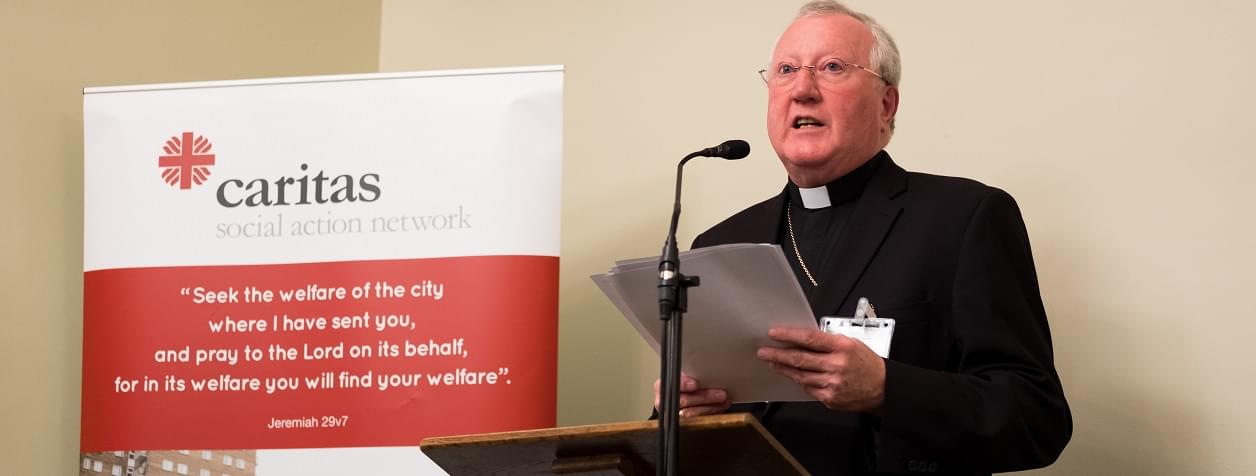Bishop Terence Drainey, Chair of CSAN, joined other faith leaders in a letter to the Chancellor of the Exchequer on the growing challenge of debt among households through the Covid-19 pandemic. The letter was coordinated by the Joint Public Issues Team.
Full text of the letter
Dear Chancellor
We are writing because we are gravely concerned about the growing crisis of household debt that millions of families are facing this Christmas.
As church and Christian leaders from across the country, we have witnessed the hardship experienced by low income families during the pandemic. We have heard countless stories from people who have faced awful choices, such as between affording food or falling behind on rent.
Many of our churches have been on the frontline of providing food and essentials. Hundreds of churches provide debt advice to those at risk. We know from experience that this situation is exceptional, and therefore requires an exceptional response.
Our experiences on the ground are increasingly borne out by the statistical evidence. The pandemic has hit the lowest income families hardest, further lowering incomes and increasing the price of essential outgoings. The Resolution Foundation recently found that 54% of the lowest income families have needed to borrow to pay for necessities during the pandemic.
By August, 6 million people had fallen behind on at least one household bill, and the evidence is that the later lockdowns will have amplified this problem. Rental arrears increased dramatically during lockdown and 350,000 households have been contacted by their landlords about eviction. Tragically, it is families with children who are worst affected. For many this will be a frightening Christmas period.
The charity Stepchange estimates the pandemic has led to 2.87 million people being at high risk of long-term debt. The human cost of problem debt is high and goes beyond simple lack of resources. Worry and stress in households can be debilitating and has long-term mental health consequences, especially for children. There are also economic consequences arising from families being unable to spend, to move and to take up employment. As the economy restarts, many families will be prevented from participating in or benefiting from new opportunities as they are held back by lockdown debt. Creditors, such as private landlords, will also be inhibited by holding large debts which will be difficult or impossible to collect.
This crisis in household debt is continuing to grow, and the current inadequate systems for addressing it will lead to many families facing unnecessary distress and hardship. We are asking that you work with communities, churches, charities and creditors to create a comprehensive and just solution to the unique problem of lockdown debt. Our ambition must go beyond delay or avoidance of eviction. This Christmas is a time to give families burdened by debt a fresh start and a more hopeful future.
Yours sincerely,
Revd Lynn Green, General Secretary of the Baptist Union of Great Britain; Very Rev Dr Susan M Brown, Convenor of the Faith Impact Forum, Church of Scotland; Revd Richard Teal, President of the Methodist Conference; Carolyn Lawrence, Vice-President of the Methodist Conference; Revd Clare Downing, Moderator of the General Assembly, United Reformed Church; Mr Peter Pay, Moderator of General Assembly, United Reformed Church; Rt Revd Paul Butler, Bishop of Durham; Rt Rev Dr Alan Smith, Lord Bishop of St Albans; The Rt Revd Dr Joanne Grenfell, Bishop of Stepney, Chair of Capital Mass; The Rt Revd Rob Wickham The Bishop of Edmonton, Chair of Capital Mass; Rt. Revd. Adrian Newman, Former Bishop of Stepney and Dean of Rochester, Church Urban Fund; Lieut-Colonel Dean Pallant, Salvation Army; Rt Revd Terence P Drainey, Bishop of Middlesbrough and Chair of Caritas Social Action Network; Most Rev Mark Strange Bishop of Moray, Ross and Caithness, Primus of the Scottish Episcopal Church; Liz Slade, Chief Officer of the General Assembly of Unitarian and Free Christian Churches; Rev. Dyfrig Rees, General Secretary of the Union of Welsh Independents; Rev Canon Dr Ellen Loudon, Director of Social Justice – Diocese of Liverpool, Chair – Together Liverpool; Paula Stringer, Chief Executive, Christians Against Poverty; Bob Fyffe General Secretary, Churches Together in Britain and Ireland; Revd Dr Paul Goodliff, General Secretary, Churches Together in England; Revd Paul Rochester, General Secretary of the Free Churches Group, and many leaders of Christian congregations at local level.




